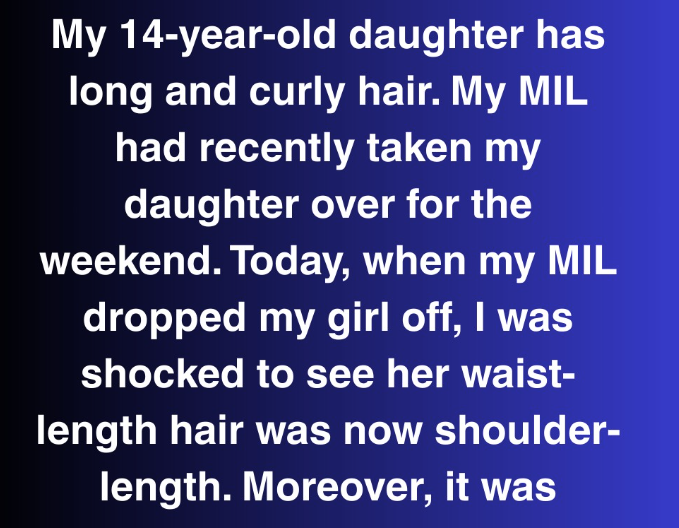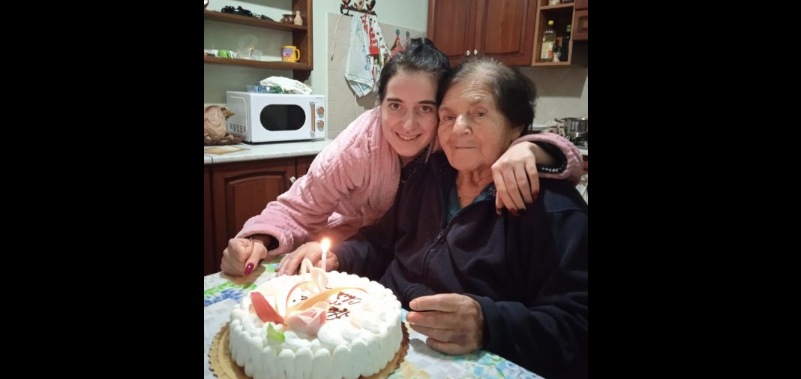My 14-year-old daughter, Amira, has always had long, curly hair that cascaded past her waist. Last weekend, my mother-in-law took Amira to her house for a visit. When she returned home today, I was stunned to see Amira’s beautiful, waist-length hair transformed into a shoulder-length cut. The ends were uneven, jagged, as if someone had hastily taken scissors to it without care.
Amira avoided my gaze. She murmured something about needing rest and headed to her room without her usual warmth—no hug, no smile, just silence. My mother-in-law, however, stood in our living room with a casual smile, as if she’d simply taken Amira on a fun outing.
Trying to steady my voice despite my trembling hands, I asked, “What happened to her hair?”
She gave a dismissive shrug. “Oh, we gave her a little change. I thought it was time for something fresh. That long hair must’ve been such a burden.”
I stared, disbelief washing over me. “You cut her hair without discussing it with me? Without her permission?”
She sighed, as if I were overreacting. “It’s only hair. It’ll grow back. She liked it, didn’t she, sweetheart?” she called toward the hallway.
Silence. Then, the sharp sound of Amira’s bedroom door closing.
Amira had cherished her hair for years. It was more than strands to her—it was part of her identity. She spent hours brushing it, experimenting with styles from Pinterest, and carefully braiding it before bed to keep it smooth. She’d even planned to donate it when it reached the right length. Her hair was a dream, a passion, a piece of who she was.
I wanted to shout, to demand my mother-in-law leave, but with my husband, Farid, still at work and our younger son nearby, I kept my composure. In a strained voice, I said, “I think you should go now.”
She huffed, grabbed her purse, and mumbled something about kids being “overly sensitive” before leaving.
As soon as the door closed, I went to Amira’s room. She lay on her bed, hoodie up, eyes red from crying.
“Talk to me, habibti,” I said, sitting beside her.
Her voice broke as she spoke. “I didn’t want it. She said if I didn’t let her cut it, she’d do it while I was sleeping.”
My breath caught.
“She kept saying it was ‘too much’ and ‘not right for my age.’ That it made me look unkempt. She wouldn’t listen.”
My heart shattered. I wanted to storm to my mother-in-law’s house and confront her. But Amira continued.
“She took me to her friend’s house—some lady who used to cut hair, I think—and she held my shoulders while the woman started chopping. I was crying, and she told me to stop acting like a child.”
Amira turned away, facing the wall. “I didn’t know how to stop her.”
Rage surged through me, but I didn’t want to overwhelm Amira. Instead, I sat quietly, rubbing her back until she drifted to sleep.
When Farid came home, I recounted everything. At first, he couldn’t believe his mother would do such a thing. But when he saw Amira’s face—her inability to meet his eyes—his disbelief turned to resolve.
The next morning, we tried talking to Amira, but she remained silent. Farid called his mother, and the conversation was tense. She insisted we were “too soft” on Amira, that she needed “structure” and “humility.” Farid ended the call abruptly.
Our relationship with her grew distant. We stopped the weekend visits, and she didn’t reach out. Amira was quieter for weeks but gradually began to regain her spark.
Then, a month later, we received a surprising call from her school. Amira had entered a local writing contest and won in the personal narrative category with an essay about “the haircut.” The school sought our permission to publish it on their website and submit it to a regional competition.
Reading her essay brought tears to my eyes. Amira wrote about the pain of losing her voice and having a part of her identity taken without consent. Yet, she transformed that pain into strength, vowing not to let others dictate her appearance or worth. Her words were raw, powerful, and inspiring.
Farid teared up too. We gave the school our approval.
Then came an unexpected turn: a nonprofit focused on youth advocacy and bodily autonomy reached out. They wanted to feature Amira’s essay in their newsletter and invite her to speak on a youth panel. We asked Amira, and though nervous, she agreed.
Weeks later, she stood on a community center stage, speaking into a microphone with a poise I’d never seen. The audience—parents and teens alike—applauded, some wiping away tears.
We celebrated with ice cream that night, her smile brighter than ever.
But the impact didn’t end there. The school counselor shared that Amira’s essay inspired two other girls to speak up about adults controlling their appearance—whether it was clothing, weight, or hair. Her story sparked a ripple effect, prompting the school to organize a workshop on youth consent and self-expression.
Then, the most surprising moment of all: my mother-in-law called. I ignored her voicemails at first. But one day, she arrived at our door.
I nearly closed it on her, but Amira, with a quiet strength, said, “I want to hear her.”
We let her in. She seemed different—less defiant, more subdued.
She handed Amira a gift: a silver hairbrush engraved with her name, alongside a printed copy of her essay.
“I read it,” my mother-in-law said, her voice unsteady. “I didn’t understand how much it meant to you. I thought I was doing the right thing. I thought…”
She paused. “My mother did the same to me. I hated it, but I never spoke up.”
Amira nodded, saying little.
My mother-in-law turned to me. “I’m sorry. To both of you.”
We didn’t mend everything that day. Trust takes time. But she began making an effort—asking Amira what she wanted instead of deciding for her.
Months later, when Amira’s hair was long enough to donate, we went to the salon together—her choice, her stylist. The cut was clean, intentional, and joyful. Amira smiled the entire drive home.
This experience taught me the power of a voice, no matter how small or shaky. Amira found hers through hardship, but she held onto it. In doing so, she inspired others—including her grandmother—to listen and grow.
If someone ever says it’s “only hair” or “a small thing,” think again. Sometimes, the smallest things carry the deepest meaning.
Thank you for reading. If Amira’s story resonates with you, share it. It might encourage someone else to find their voice too. 💬❤️




